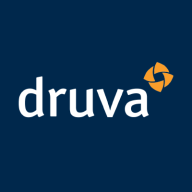

AWS Elastic Disaster Recovery and Druva Phoenix compete in the disaster recovery space. Druva Phoenix has the upper hand for its cloud-native capabilities and comprehensive security features, appealing to businesses looking for flexible and secure data protection strategies.
Features: AWS Elastic Disaster Recovery is configured to offer seamless recovery within AWS environments, featuring efficient recovery time objectives and flexible cloud resources. It promises users rapid operation resumption using scalable cloud infrastructure. Druva Phoenix stands out with its cloud-first capabilities emphasizing data protection, including ransomware recovery, compliance solutions, and extensive cybersecurity features, ensuring robust security and simplified data management.
Room for Improvement: AWS Elastic Disaster Recovery can improve by expanding seamless integration options for non-AWS ecosystems and enhancing user interface simplicity for broader ease of use. Some users also might find its cost management challenging given unexpected infrastructure expenses. Druva Phoenix could benefit from expanding its ransomware protection beyond VMs to include Hyper-V and Nutanix, improving AI analytics tools for effective use in data protection, and addressing occasional performance slowdowns when dealing with large, intensive backups.
Ease of Deployment and Customer Service: AWS Elastic Disaster Recovery, integrated into the AWS Management Console, simplifies deployment for AWS users but presents hurdles for those outside the ecosystem. Its customer service is reliable yet perceived as more technical. Druva Phoenix, with its SaaS model, offers broader compatibility and straightforward deployment, easily adaptable across various platforms. Customers frequently acknowledge Druva's customer-centric service as exceptional, ensuring effective support and assistance.
Pricing and ROI: AWS Elastic Disaster Recovery may incur higher upfront costs due to associated AWS infrastructure expenses but offers significant ROI for AWS-centric environments. Druva Phoenix, adopting a flexible subscription-based pricing model, provides an economical long-term solution with favorable ROI through cost-effective data management and minimal initial financial outlay.


CloudEndure Disaster Recovery enables real-time replication and rapid recovery to enhance organizational resilience. Key features include block-level data replication, ease of use, cost-effectiveness, and automated recovery orchestration. Users benefit from increased efficiency, improved workflows, and enhanced data management, significantly improving organizational performance and business continuity.
Druva Phoenix is a comprehensive cloud-based data protection and management solution that enables organizations to securely backup, recover, and manage their data across endpoints, physical servers, virtual machines, and cloud applications. With its scalable and flexible architecture, Druva Phoenix simplifies data protection and eliminates the need for traditional backup infrastructure.
By leveraging the power of the cloud, Druva Phoenix offers organizations a cost-effective and efficient way to protect their critical data. It provides automated backup and recovery capabilities, ensuring that data is always protected and easily recoverable in the event of a disaster or data loss. With its global deduplication and compression technology, Druva Phoenix minimizes storage requirements and reduces costs.
Druva Phoenix also offers advanced features such as point-in-time recovery, allowing organizations to restore data to a specific point in time, and granular file-level recovery, enabling users to recover individual files or folders. Its intuitive web-based console provides a centralized view of all protected data, making it easy to manage and monitor backups across the entire organization.
In addition to data protection, Druva Phoenix offers comprehensive data management capabilities. It enables organizations to gain insights into their data through advanced analytics and reporting, helping them make informed decisions and optimize their storage resources. Druva Phoenix also supports legal and compliance requirements by providing eDiscovery capabilities and ensuring data is retained and disposed of according to regulatory guidelines.
With its cloud-native architecture, Druva Phoenix offers organizations the flexibility to protect and manage their data across a wide range of environments, including on-premises, remote offices, and cloud applications such as Microsoft 365 and Google Workspace. It seamlessly integrates with popular cloud platforms like AWS and Azure, allowing organizations to leverage their existing cloud investments.
We monitor all Cloud Backup reviews to prevent fraudulent reviews and keep review quality high. We do not post reviews by company employees or direct competitors. We validate each review for authenticity via cross-reference with LinkedIn, and personal follow-up with the reviewer when necessary.